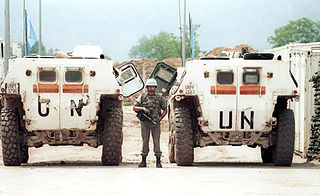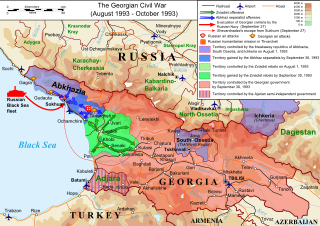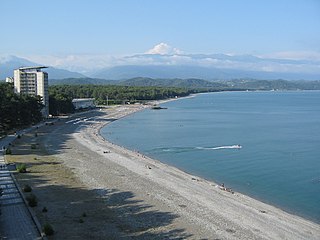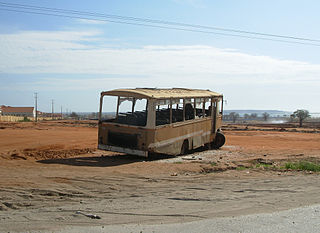
The United Nations Observer Mission in Georgia (UNOMIG) was established by United Nations Security Council Resolution 858 on 24 August 1993 to verify compliance with a 27 July 1993 ceasefire agreement between the Republic of Georgia and forces in Abkhazia with special attention given to the situation in the city of Sukhumi, Georgia. It was also to investigate reports of ceasefire violations, attempt to resolve such incidents with the parties involved, and to report to the Secretary-General of the United Nations on the implementation of its mandate. 88 military advisors were authorized to be deployed to the region. It ended on 15 June 2009, when Russia vetoed an extension of the mission. The last observers left the region on 15 July 2009.
The United Nations Mission of Observers in Tajikistan (UNMOT) was a peacekeeping mission established by the United Nations Security Council in December 1994, and its mandate expired in May 2000. Its purpose was to monitor peace agreements during and after the Tajikistan Civil War. The observers were first deployed in the wake of the ceasefire, in 1994, between the ruling government of Tajikistan, led by Emomali Rahmonov, and the United Tajik Opposition. After the UN-sponsored armistice ended the war in 1997, the UN expanded the mission's original mandate to monitor the peace and demobilization. The mission was headquartered in Dushanbe, Tajikistan.

United Nations Security Council resolution 743, adopted unanimously on 21 February 1992, after reaffirming resolutions 713 (1991), 721 (1991), 724 (1991), 727 (1992) and 740 (1992), and considering that the situation in the Socialist Federal Republic of Yugoslavia constituted a threat to international peace and stability, the council established a peacekeeping mission in the country, known as the United Nations Protection Force (UNPROFOR), with the aim of reaching a peaceful political settlement in the region.

United Nations Security Council resolution 849, adopted unanimously on 9 July 1993, after noting with concern the recent fighting around Sukhumi in the disputed region of Abkhazia, the Council requested the Secretary-General Boutros Boutros-Ghali to send his Special Envoy to the region in order to reach agreement for a ceasefire between Abkhazia and Georgia, and once implemented, authorised a dispatch of 50 military observers. It was the first Security Council resolution on the conflict.

United Nations Security Council resolution 858, adopted unanimously on 24 August 1993, after recalling resolutions 849 (1993) and 854 (1993) and noting a ceasefire between Abkhazia and Georgia and commitments to withdraw forces, the council established the United Nations Observer Mission in Georgia (UNOMIG) for an initial period of 90 days pending further extension.

United Nations Security Council resolution 876, adopted unanimously on 19 October 1993, after reaffirming resolutions 849 (1993), 854 (1993) and 858 (1993) concerning the Georgian–Abkhazian war, the council determined that the situation continued to constitute a threat to international peace and security.

United Nations Security Council resolution 881, adopted unanimously on 4 November 1993, after reaffirming resolutions 849 (1993), 854 (1993), 858 (1993) and 876 (1993) concerning the Georgian–Abkhazian war, the Council extended the mandate of the United Nations Observer Mission in Georgia (UNOMIG) until 31 January 1994.

United Nations Security Council resolution 892, adopted unanimously on 22 December 1993, after reaffirming resolutions 849 (1993), 854 (1993), 858 (1993), 876 (1993) and 881 (1993) on the Georgian–Abkhazian war and Resolution 868 (1993) concerning the safety of United Nations peacekeepers, the council discussed the phased deployment of 50 military observers in Georgia.

United Nations Security Council resolution 896, adopted unanimously on 31 January 1994, after reaffirming resolutions 849 (1993), 854 (1993), 858 (1993), 876 (1993), 881 (1993) and 892 (1993) on the Georgian–Abkhazian war and Resolution 868 (1993) concerning the safety of United Nations peacekeepers, the Council considered the possible establishment of peacekeeping force in Abkhazia and Georgia, and discussed the peace process.

United Nations Security Council resolution 901 was adopted unanimously on 4 March 1994. After reaffirming resolutions 849 (1993), 854 (1993), 858 (1993), 876 (1993), 881 (1993), 892 (1993) and 896 (1994), the council extended the mandate of the United Nations Observer Mission in Georgia (UNOMIG) until 31 March 1994.

United Nations Security Council resolution 906, adopted unanimously on 25 March 1994, after reaffirming resolutions 849 (1993), 854 (1993), 858 (1993), 876 (1993), 881 (1993), 892 (1993), 896 (1994) and 901 (1994), the council regretted that no agreement on a political settlement had been made between Abkhazia and Georgia, and extended the mandate of the United Nations Observer Mission in Georgia (UNOMIG) until 30 June 1994.

United Nations Security Council resolution 934, adopted unanimously on 30 June 1994, after reaffirming resolutions 849 (1993), 854 (1993), 858 (1993), 876 (1993), 881 (1993), 892 (1993), 896 (1994), 901 (1994) and 906 (1994), the Council noted the talks between Abkhazia and Georgia, and extended the mandate of the United Nations Observer Mission in Georgia (UNOMIG) until 21 July 1994.

United Nations Security Council resolution 937, adopted on 21 July 1994, after reaffirming resolutions 849 (1993), 854 (1993), 858 (1993), 876 (1993), 881 (1993), 892 (1993), 896 (1994), 901 (1994), 906 (1994) and 934 (1994), the Council expanded the United Nations Observer Mission in Georgia (UNOMIG) to include co-operation with the Commonwealth of Independent States (CIS) and extended its mandate until 13 January 1995.

United Nations Security Council resolution 952, adopted unanimously on 27 October 1994, after reaffirming Resolution 696 (1991) and all subsequent resolutions on Angola, the Council discussed the implementation of a ceasefire in the country and extended the mandate of the United Nations Angola Verification Mission II until 8 December 1994.

United Nations Security Council resolution 968, adopted unanimously on 16 December 1994, after noting statements by the president of the security council and reports by the Secretary-General Boutros Boutros-Ghali on the situation in Tajikistan, the council established the United Nations Mission of Observers in Tajikistan (UNMOT) and addressed the process of national reconciliation in the country.

United Nations Security Council resolution 971, adopted unanimously on 12 January 1995, after reaffirming resolutions 849 (1993), 854 (1993), 858 (1993), 876 (1993), 881 (1993), 892 (1993), 896 (1994), 901 (1994), 906 (1994), 934 (1994) and 937 (1994), the Council extended the United Nations Observer Mission in Georgia (UNOMIG) until 15 May 1995.

United Nations Security Council resolution 976, adopted unanimously on 8 February 1995, after reaffirming resolutions 696 (1991) and all subsequent resolutions on Angola, the Council authorised the establishment of a new peacekeeping mission in the country, the United Nations Angola Verification Mission III with an initial mandate ending on 8 August 1995.

United Nations Security Council resolution 993, adopted unanimously on 12 May 1995, after reaffirming all resolutions on Georgia, particularly 971 (1995), the Council discussed efforts for a political settlement between Georgia and Abkhazia and extended the mandate of the United Nations Observer Mission in Georgia (UNOMIG) until 12 January 1996.

United Nations Security Council resolution 1036, adopted unanimously on 12 January 1996, after reaffirming all resolutions on Georgia, particularly 993 (1995), the Council discussed efforts for a political settlement between Georgia and Abkhazia and extended the mandate of the United Nations Observer Mission in Georgia (UNOMIG) for another six months until 12 July 1996.

United Nations Security Council resolution 1065, adopted unanimously on 12 July 1996, after reaffirming all resolutions on Georgia, particularly 1036 (1996), the Council discussed efforts for a political settlement between Georgia and Abkhazia and extended the mandate of the United Nations Observer Mission in Georgia (UNOMIG) until 31 January 1997.


















